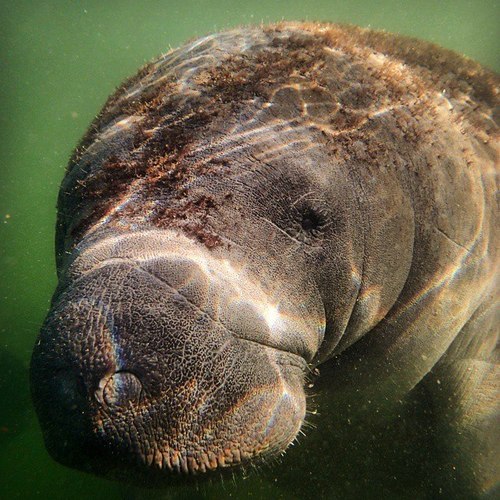#save the manatee club
A few days ago, the U.S. Fish and Wildlife Service (FWS) proposed to downgrade the manatee from an ‘endangered’ to ‘threatened’ status under the Endangered Species Act (ESA). Indeed, the West Indian manatees populations have been steadily increasing, and the agency has stated that the species should no longer be considered endangered.

(Photo by David Roche)
Endangered listing means that a species is “currently in danger of extinction throughout all or a significant portion of its range”, while a threatened listing states that the species “is likely to become endangered within the foreseeable future.”
This marine mammal was originally listed under the ESA about 50 years ago, as the manatee population was on the brink of extinction due to overhunting and collisions with boats. During the first aerial surveys in the 1990s, officials counted close to 1,300 manatees in Florida. Nowadays, officials have counted over 6,300 in Florida alone, and scientists estimate that 13,000 manatees live in their natural range of the Caribbean and the northern coasts of Colombia, Venezuela and Brazil.
The manatees will remain protected under the Marine Mammal Protection Act,which makes it illegal to harass, feed, hunt, capture, collect, or kill any marine mammal or part of a marine mammal, and which improves the response rate to strandings or mortality events.
I think this is very encouraging to see that the efforts triggered by the ESA listing have worked, and could work for many other species. I have also read that the agency has guaranteed this would not dismantle slow-speed zones or lessen other protections for the species. This change only reflects the improvements in the population numbers in recent years.

(Photo by me or one of my coworkers)
Manatee conservation groups are, however, not thrilled about this proposed downgrading in the ESA listing, and call this decision a misguided and premature one. Dr. Katie Tripp, director of science and conservation for the Maitland, Florida-based Save the Manatee Club, has warned that declassification may potentially lead to undoing all of the good that protection efforts have achieved so far. Tripp also argues that many other threats the manatees population face have not been reduced enough to guarantee the welfare of manatee populations, such as pollution and increased human interaction.
For now, this proposed re-listing is open for public comments until April 7th.
